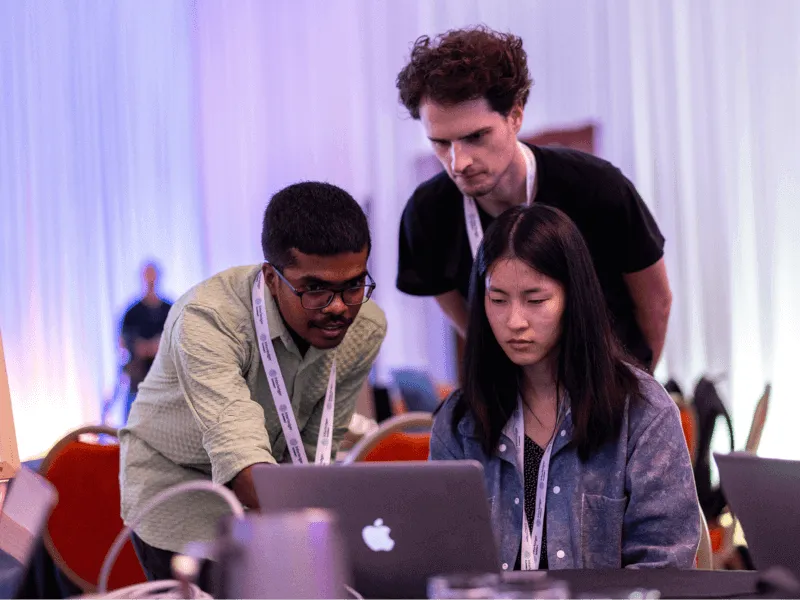
Get Hacking!
Interledger is hosting student hackathons in Oaxaca, Estado de México, Aguascalientes, and CDMX. These dynamic, hands-on, two-day events will bring open payments technology and practical fintech skills directly to university campuses, empowering the next generation of innovators.
The student hackathons serve as a lead up to the 2025 Interledger Hackathon in Mexico City on November 8–9, where developers, innovators, and students passionate about transforming global payments will have a chance to leave their mark on the world of finance. This hackathon will also form part of the wider Interledger Summit, taking place November 5–6, which explores how tech, policy, commerce, and creativity intersect to drive systemic change in global payments.
We are challenging participants to come up with novel ways to simplify cross-border payments, promote financial inclusion, and automate payment processes, helping build a more accessible and seamless financial ecosystem.
Past Hackathons
Participants of Interledger hackathons work with open-source Interledger protocol and APIs to create real-world applications that can transform how money moves globally.
The winners of the ILP Summit 2024 Hackathon were Byron Coetsee and Lex Campbell, recognized for building a multi-tenant network for open payment transfers from the ground up. Their project impressed judges not only with its innovative technical approach but also with its hardware presentation. Designed to bring banking services to unbanked populations in rural areas with limited internet connectivity, the solution leverages LoRa technology, fingerprint authentication, and the Interledger Protocol to enable secure financial transactions - without relying on traditional banking infrastructure, internet access, or smartphones.
Second place went to Andrew Reiblein, Ben Janecke, Brett Scheepers, and Tamira Gunzburg-Chibua for their in-depth work on Rafiki’s core, focusing on authentication and the Grant Negotiation and Authorization Protocol (GNAP). They extended Interledger functionality to enable multi-channel, multi-party approvals, democratizing payments one approval at a time. Their project enhanced the open payments API to support diverse business and social use cases, demonstrated through Rafiki’s test authentication system, backend, and Account Servicing Entity (ASE), enabling secure, flexible consent for transactions.
Third place went to Cade Sayner, Kaden Carey, Mujaahid Salie, and Luke Davis for presenting a well-structured charity initiative aimed at helping animals find new families. With the Society for the Prevention of Cruelty to Animals (SPCA) lacking modern donation tools, their solution used Open Payments to simplify and personalize giving, allowing donors to contribute directly to specific animals. This proof of concept offers a versatile model that can be adapted for various charitable causes, improving how donations support animal welfare.
UCT Finhub X Interledger Student Hackathon
Earlier this year, students had the chance to get real-life experience in payments solution development, team-based rapid problem solving, as well as all the pressure of real-world tech product development. First spot at the University of Cape Town Financial Innovation Hub and Interledger Hackathon was taken by Team Direla, who developed a QR code-based payment system for low-income users and retail partners that doesn't require point-of-sale devices. In second place was Team Fin Illuminaries with a USSD-based system for rural financial services, and in third place, Team FlowFi with a student crowdfunding platform.
“The bootcamp gave us the context we needed to approach financial systems critically. It also reminded us how powerful teamwork is. Everyone brought something different, and that made all the difference,” shares Direla team member, Dylan Tasdhary. “Some of us were new to hackathons, others had a few under the belt, but the energy was the same. There’s something exciting about solving real problems under pressure. The final stretch, where everything starts coming together - that’s where we really locked in as a team.”
5 tips to wow the judges
Timea Nagy, ILF Engineering Manager, says participants need to keep five things in mind if they want to stand out:
1. Set clear goals:
Identify meaningful financial challenges from personal or local experiences, such as issues faced by families, neighborhoods, or university communities. Ensure the problem is relatable and demonstrates a clear need for open payments technology.
2. Structure your solution:
Clearly define the problem, the proposed solution, and why open payments is the right tool to address this challenge. Aim for a novel application or creative twist - even familiar formats like donation platforms need differentiation to stand out.
3. Leverage mentorship and resources:
Don’t hesitate to ask mentors for guidance and make full use of tutorials and available resources to build and refine your project.
4. Prepare for Presentation:
Judges have limited time, so deliver a confident, concise pitch that emphasizes the impact of your solution and its fit with open payments. Record a demo in advance to avoid technical issues and ensure your project is showcased effectively, even if live presentations run into problems. Great pitches win hearts and prizes.
5. Be bold and enjoy the process:
Hackathons are about innovative ideas and making real-world impact, not just technical achievements. Be creative, take calculated risks & have fun.
Making a difference
One of the main drawcards for Interledger hackathon participants has been the satisfaction of seeing their creations put to use in local communities.
The time constraints also mean participants learn to ideate and create under intense pressure, delivering an MVP in just two days. What’s more, the pitching process gives participants real world experience of how to effectively get their ideas across in a simple yet compelling way, that is very similar to what they will face when pitching to future investors.
“This is innovation with a triple shot of caffeine. But as intense as the experience is, we always make sure that we equip participants with a solid understanding of how the Interledger Protocol works as well as mentorship by our Interledger teams. Our hackathons have been architected on a foundation of idea-sharing, collaboration and co-creation,” shares Timea Nagy.